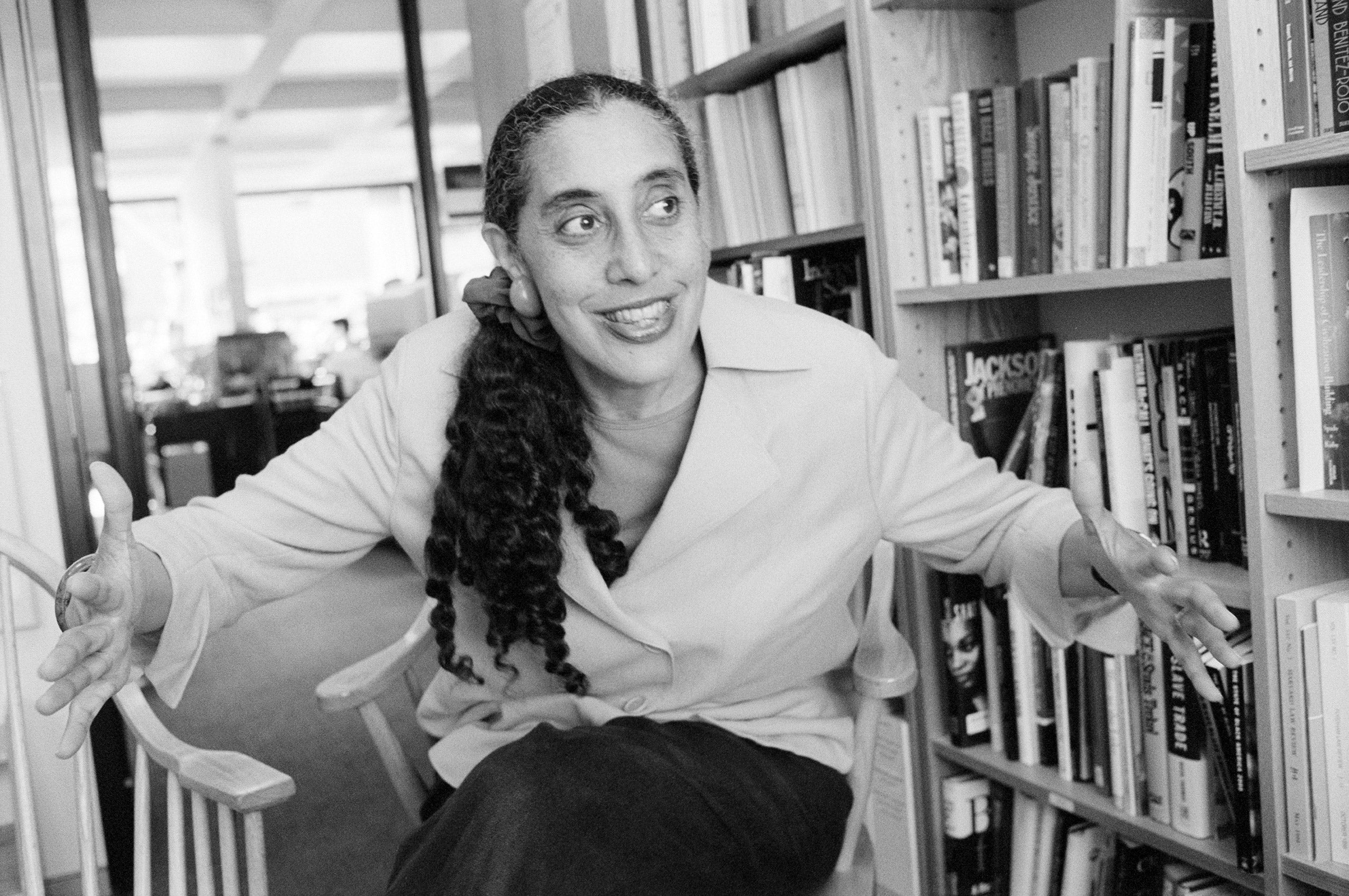During a celebratory event for Lani Guinier at Harvard Law School in February 2018, Columbia Law School Professor Susan Sturm invoked a phrase that was familiar to all of Guinier’s family, friends, students and colleagues in attendance. It was a line that Guinier often used when prodding her students into pushing harder and thinking deeper: “My problem is, if you stop there …”
Guinier’s work was underlined by that sort of determination, both nationally and at Harvard, and she was renowned for her scholarship, including “Lift Every Voice,” “Becoming Gentlemen,” “The Tyranny of the Meritocracy,” and “The Miner’s Canary: Enlisting Race, Resisting Power, Transforming Democracy” (co-authored with Gerald Torres). Guinier, who was the Bennett Boskey Professor of Law, joined the Harvard Law School faculty in 1998, becoming the first woman of color to be a tenured Harvard Law professor. Following a lengthy struggle with Alzheimer’s disease, she died on Jan. 7, at age 71.
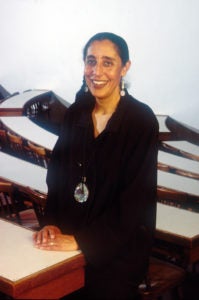
“Lani Guinier was a giant — a historic figure in American law and in the life of our Law School. Her scholarship changed our understanding of democracy — of why and how the voices of the historically underrepresented must be heard and what it takes to have a meaningful right to vote,” said John F. Manning ’85, the Morgan and Helen Chu Dean and Professor of Law at Harvard Law School. “Lani devoted her life to justice, equality, empowerment, and democracy and made the world better as a result. Her voice, her wisdom, her integrity, her bravery, her caring for others, her imagination and rigorous thinking, and her unerring sense of justice will inspire those who knew her and those who come to know of her life and legacy in the years to come.”
“If I had to think of one idea I would associate with Lani, it is ‘meaningful participation,'” said Kenneth Mack ’91, the Lawrence D. Biele Professor of Law and affiliate professor of history, Harvard University. “Lani spent her career thinking about, and working for, the proposition that people, particularly those without power, should be able to participate meaningfully in the institutions that affected their lives. Her work on voting and democracy — the work that would bring so much controversy — was all about the fragility of democratic systems. African American communities and their continuing struggles to participate, were the ‘miner’s canary,’ to use a term she later coined with Gerald Torres — evidence of largely unseen problems with the ability of many groups to engage with the democratic process.” As a colleague and friend for two decades on the faculty together, Mack said Guinier modeled meaningful participation for others. “She’d ask questions of you that no one else would ask, and would always push you, sometimes in uncomfortable ways, to think more deeply about what you were doing and why you were doing it.”
Guinier was born in New York City, the daughter of civil rights activist Eugenia Paprin and Ewart Guinier, a lawyer and union organizer of Jamaican descent. Her father attended Harvard College in 1929, the only black student at the college at the time, and later taught at Harvard, serving as the first chair of the Department of Afro-American Studies.
Guinier earned her B.A. from Radcliffe College in 1971 and her J.D. from Yale Law School in 1974. After law school, she clerked for the Hon. Damon Keith, U.S. Court of Appeals, Sixth Circuit (then chief judge of the U.S. District Court, Eastern District, Michigan.) She went on to serve as special assistant to Assistant Attorney General Drew S. Days in the Civil Rights Division during the Carter administration. She also led the voting rights project for the NAACP Legal Defense Fund.
In 1988, Guinier joined the University of Pennsylvania Law School, and was one of its most highly regarded teachers during the decade she spent there. She also devoted herself to mentoring work — something she would carry on at Harvard, noting that such mentoring is “enormously nourishing to both students and faculty.” Guinier was beloved by her students who recognized her contributions by conferring upon her the Albert M. Sacks-Paul A. Freund Award for Teaching Excellence in 2002.
“Behind Lani’s legendary scholarship and advocacy, she brought all of her talents and imagination to unlocking the creativity and collaborative possibilities of colleagues and students. She invited students to help construct the classroom and prepared them not only to do it, but to reach constantly higher levels of analysis and understanding,” said Martha Minow, the 300th Anniversary University Professor and former dean of Harvard Law School. “[S]he demonstrated how institutional and organizational change works through networks of people, not through the actions of one individual, and through alteration of ongoing operations, rather than the introduction of different actors playing the same roles. And how moving to see the vibrant and continuing network of former students, colleagues, and friends she built.”
The most painful, and perhaps most public incident of Guinier’s career occurred in 1993 when President Bill Clinton withdrew his nomination of her as assistant attorney general for civil rights following what was widely perceived to be a politically-motivated media campaign. “The irony is that it never occurred to me I would be walking into a public controversy when Clinton offered me the nomination,” she told the Harvard Law Bulletin. “After that grueling experience, I was less worried about how I would fare if I were at the center of a public controversy.” Minow cited this experience as an example of Guinier’s exceptional ability to turn “negative and even potentially devastating experiences into occasions for deeper learning.”
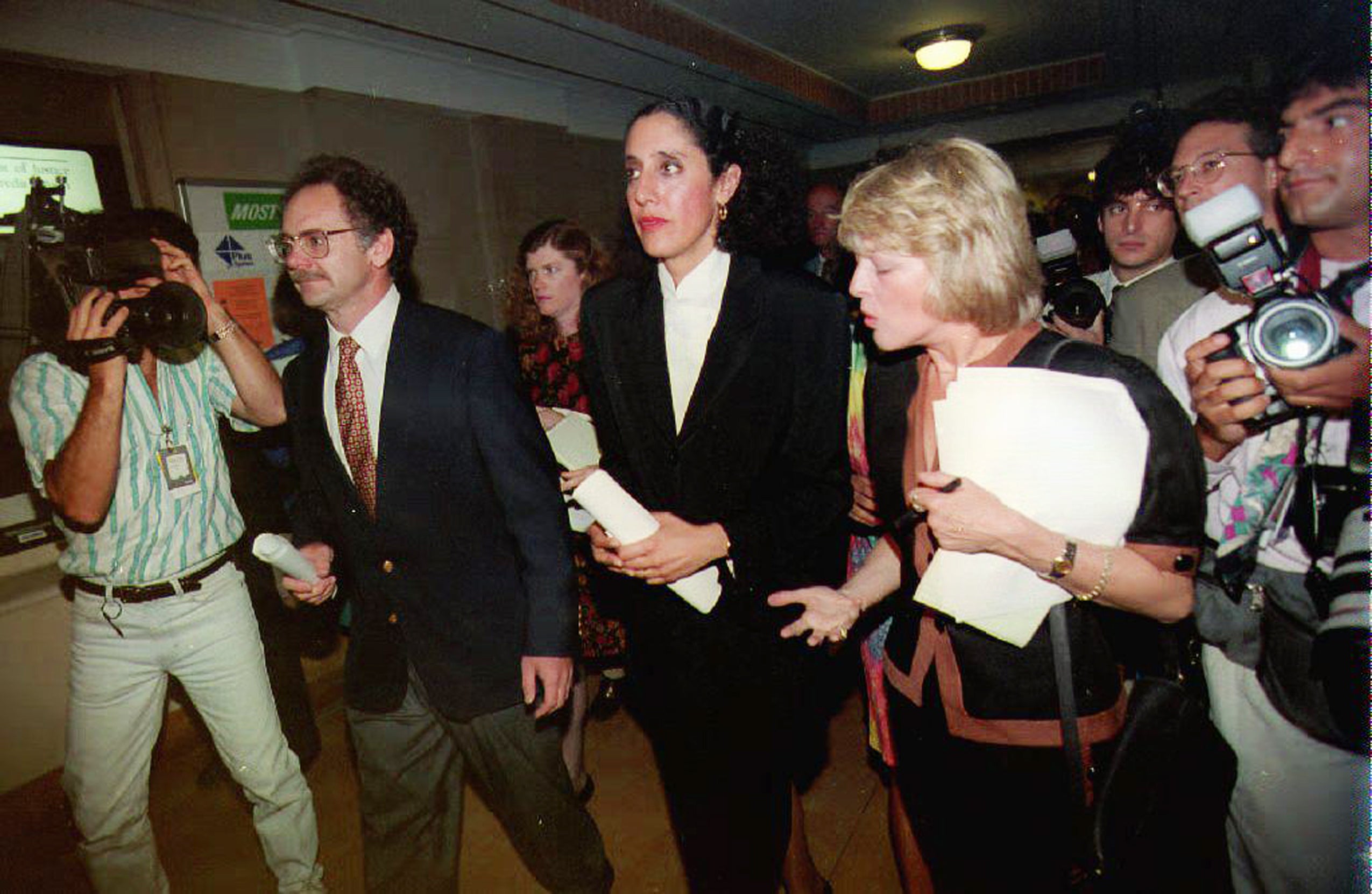
Guinier was first invited to teach at Harvard Law School in 1996 and ultimately joined the faculty in 1998, citing her admiration for colleagues Frank Michelman ’60, Charles Ogletree ’78, Cornel West, and others. Harvard has been a home not only to Guinier but also to include her husband, Nolan Bowie, who taught communications and information policy at the Kennedy School; and their son, Assistant Professor of Law Nikolas Bowie ’14 who this year also received the Albert M. Sacks-Paul A. Freund Award for Teaching Excellence, as his mother had two decades earlier.
“Lani Guinier was a towering figure, but she was also an extraordinary friend and mentor to me,” said Tomiko Brown-Nagin, dean of the Radcliffe Institute for Advanced Study and the Daniel P.S. Paul Professor of Constitutional Law at HLS, who co-taught a seminar with Guinier, and worked with her on an affirmative action legal brief. “She was a brilliant teacher as well as an excellent lawyer, and the many hours we spent together at my home writing and revising were a highlight of my first years on the Harvard Law School faculty. I will miss her deeply. Her legacy is one of fearless advocacy for civil rights, powerful scholarship, and deep commitment to the education of civic leaders. She will endure in spirit, as the many people whose lives she touched endeavor to live up to all she taught us about leading lives of impact and meaning. I am so grateful to have known her.”
Guy-Uriel E. Charles, the Charles Ogletree, Jr. Professor of Law at HLS, said: “Lani was one of the most creative and forward-thinking scholars of democracy. She was always many years ahead of her time. She saw both problems and solutions long before everyone did. She was also one of the warmest human beings ever. The first time I ever substantively interacted with Lani was early in my career. During a lunch break, I kept peppering her with questions for so long that she finally, and kindly, had to politely say that we were going to miss lunch if we didn’t get something to eat. She was the greatest academic inspiration. We will continue to honor her by doing her life’s work.”
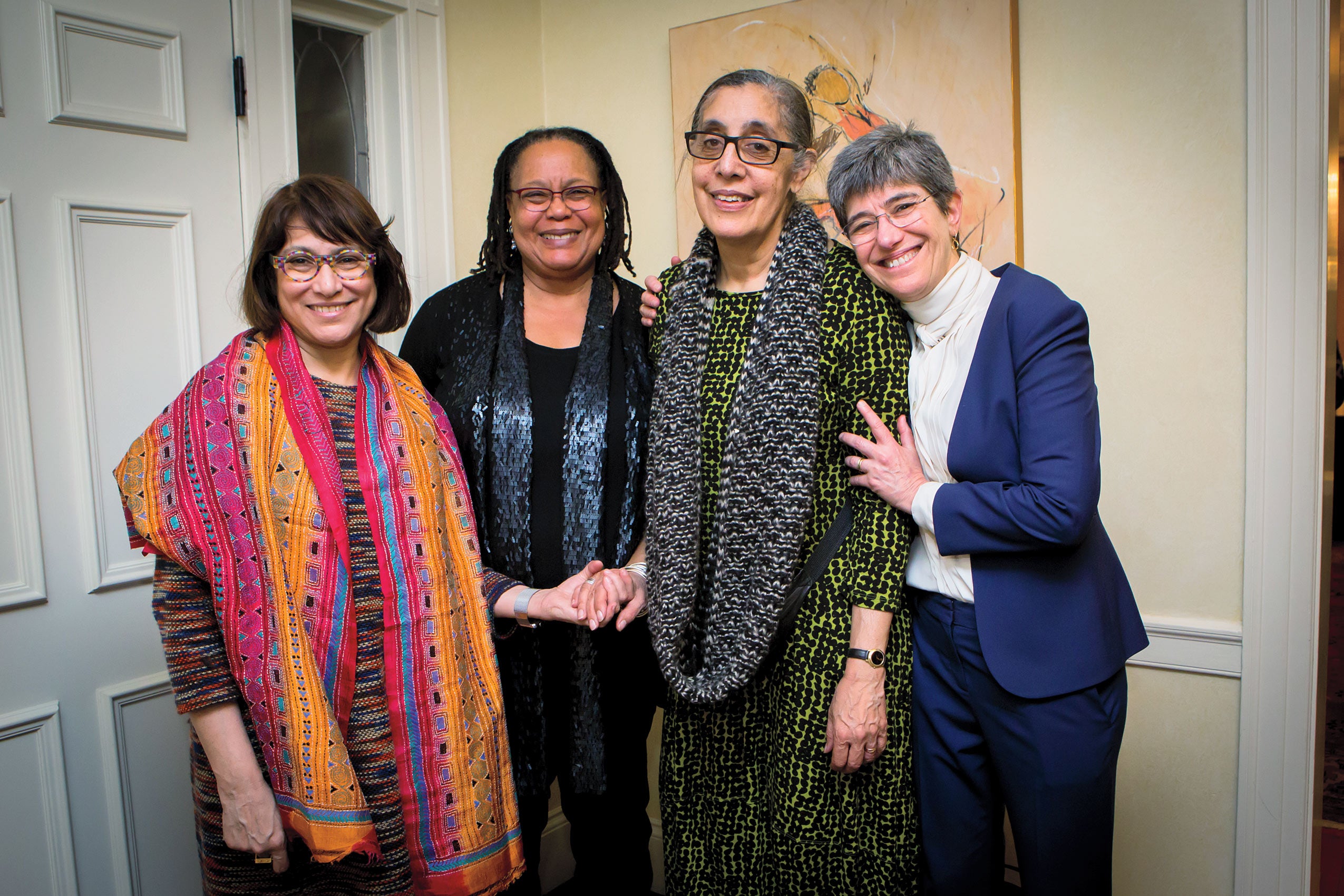
As a professor, Guinier claimed that she didn’t have a single teaching method but preferred to experiment to see what might work best for her students. “Part of the challenge is not to be rigid, either rigidly collaborative or rigidly Socratic. I always have an ear cocked for a better way,” she said in 1999. During the tribute in 2018, former student Jennifer Gachiri ’09 recalled one class where Guinier taught the case of a village in India that sued Coca-Cola and won, after the company’s water extractions in the village produced a toxic sludge that it then sold back as fertilizer. She had her students recreate a human chain, complete with handcuffs, to dramatize the lesson that corruption could be toppled.
Among Guinier’s many awards are honorary degrees from ten schools, including Smith, Spelman and Swarthmore Colleges and the University of the District of Columbia. She has also received the Champion of Democracy Award from the National Women’s Political Caucus, the Margaret Brent Women Lawyers of Achievement Award from the ABA Commission of Women in the Profession, and the Rosa Parks Award from the American Association for Access, Equity, and Diversity. In addition to her six books, she published a number of scholarly articles on topics including voting rights, race and the law, class and the law, gender and the law, access to education and revising affirmative action. Guinier was named professor emerita in 2018.
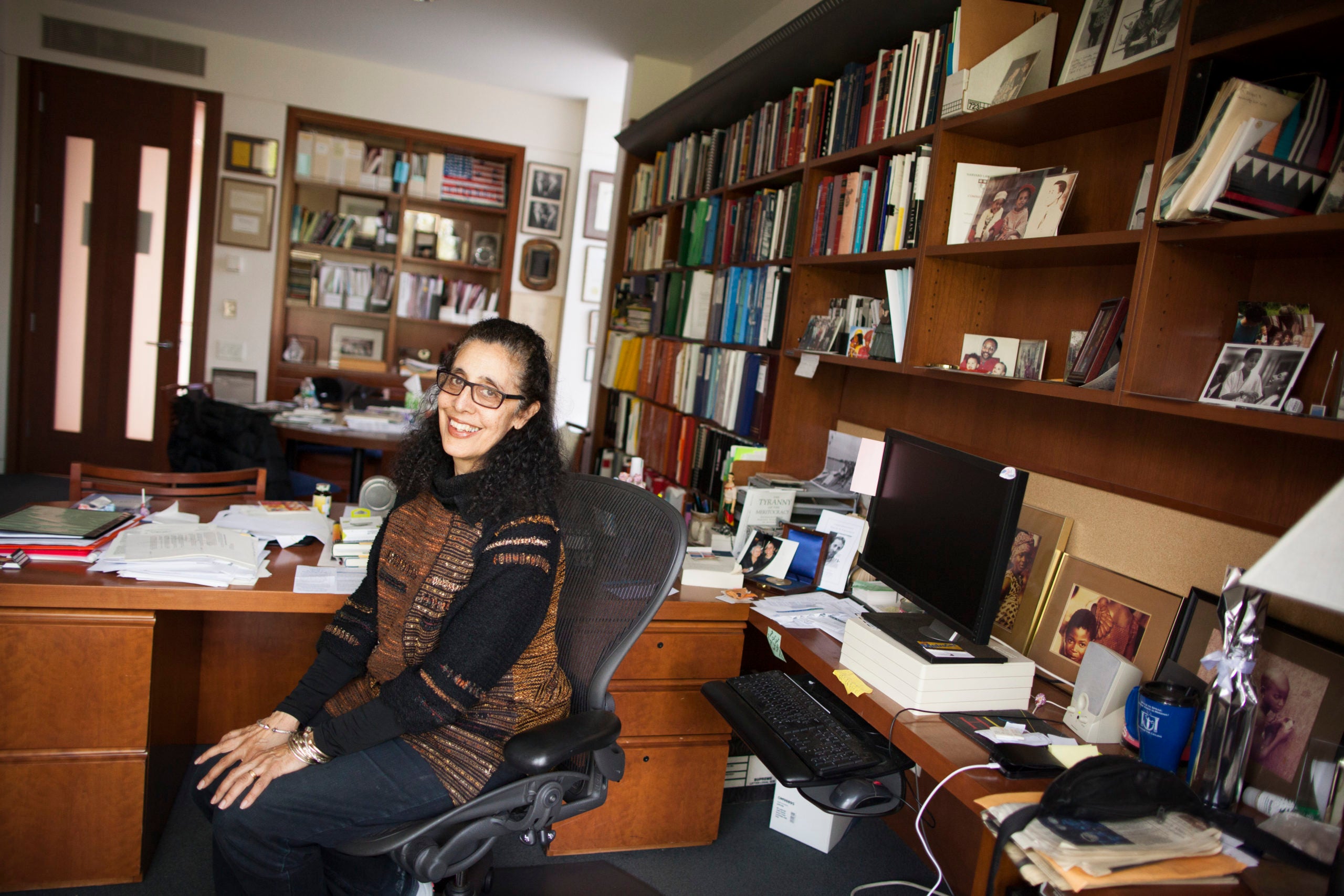
Speaking at Harvard Law School’s Class Day this year, Nikolas Bowie recalled that his mother’s fondest wish, after her Alzheimer’s diagnosis in 2013, was to continue teaching. “Teaching meant everything to her. To be honest, it made my dad and me a little angry: ‘What do you mean, you want to teach instead of spending time with us?’ I once literally had to drag her away from the classroom and hide the keys to her office.” Bowie urged the graduating class to take his mother’s lasting influence as an example, and recalled the warmth of the 2018 tribute event. “Lead a career like the one my mom did — one that concludes not with a list of your accomplishments or an accounting of your earnings, but with a celebration of the people you have empowered.”
Related
‘A towering figure’ in American law, Harvard professor Lani Guinier dies at 71 (Boston Globe)
Lani Guinier, Legal Scholar at the Center of Controversy, Dies at 71 (New York Times)
Lani Guinier, law professor and embattled Justice Department nominee, dies at 71 (Washington Post)
